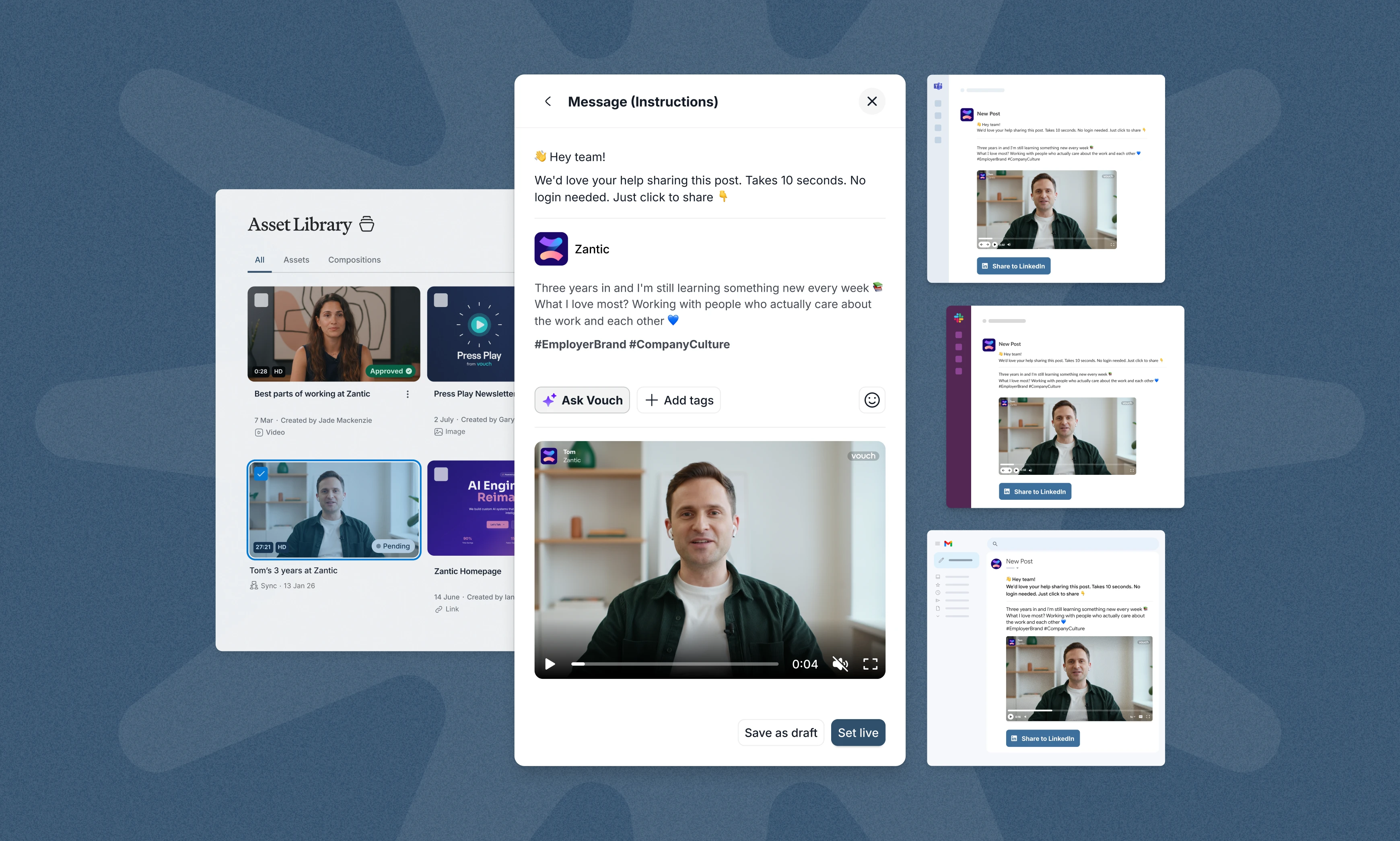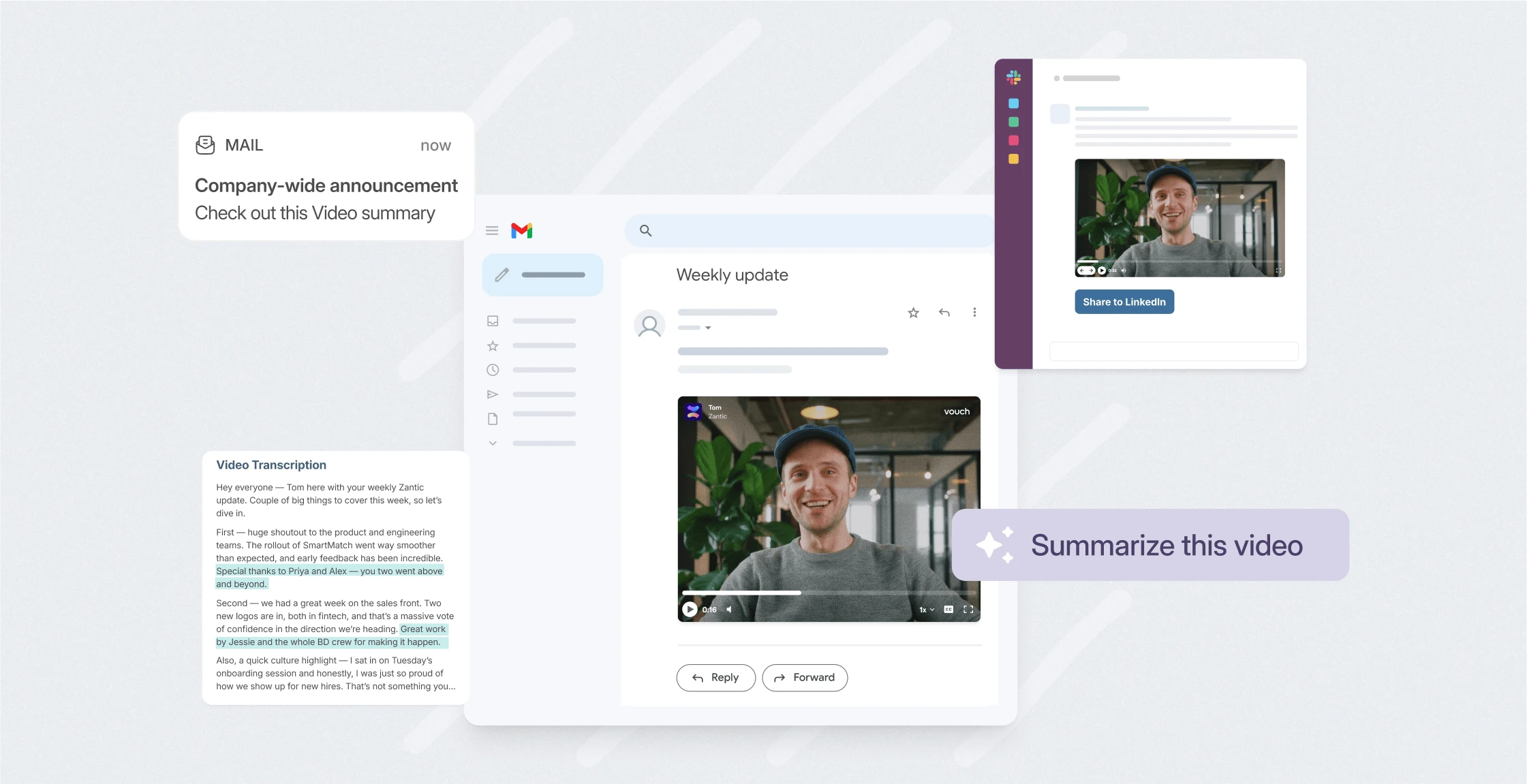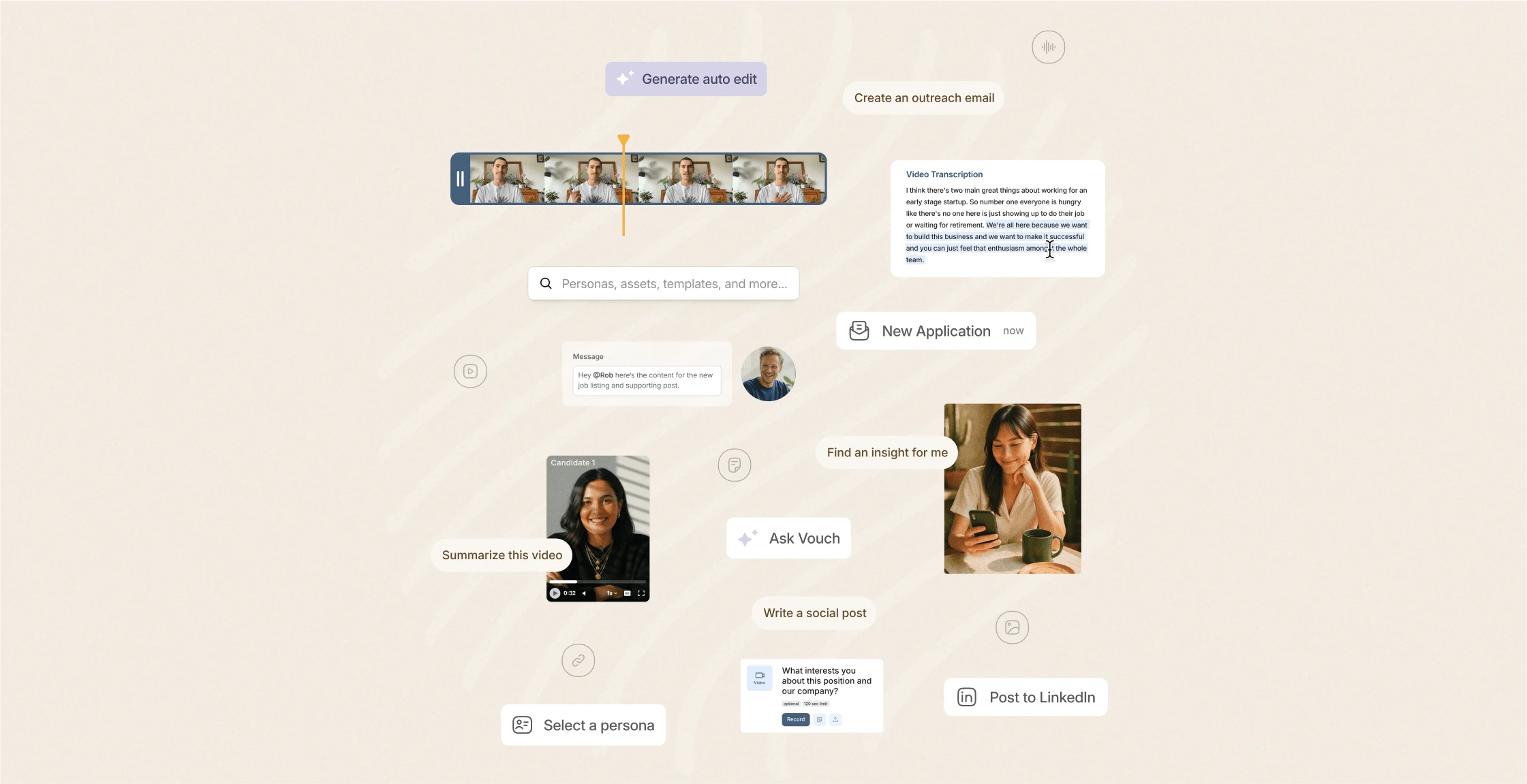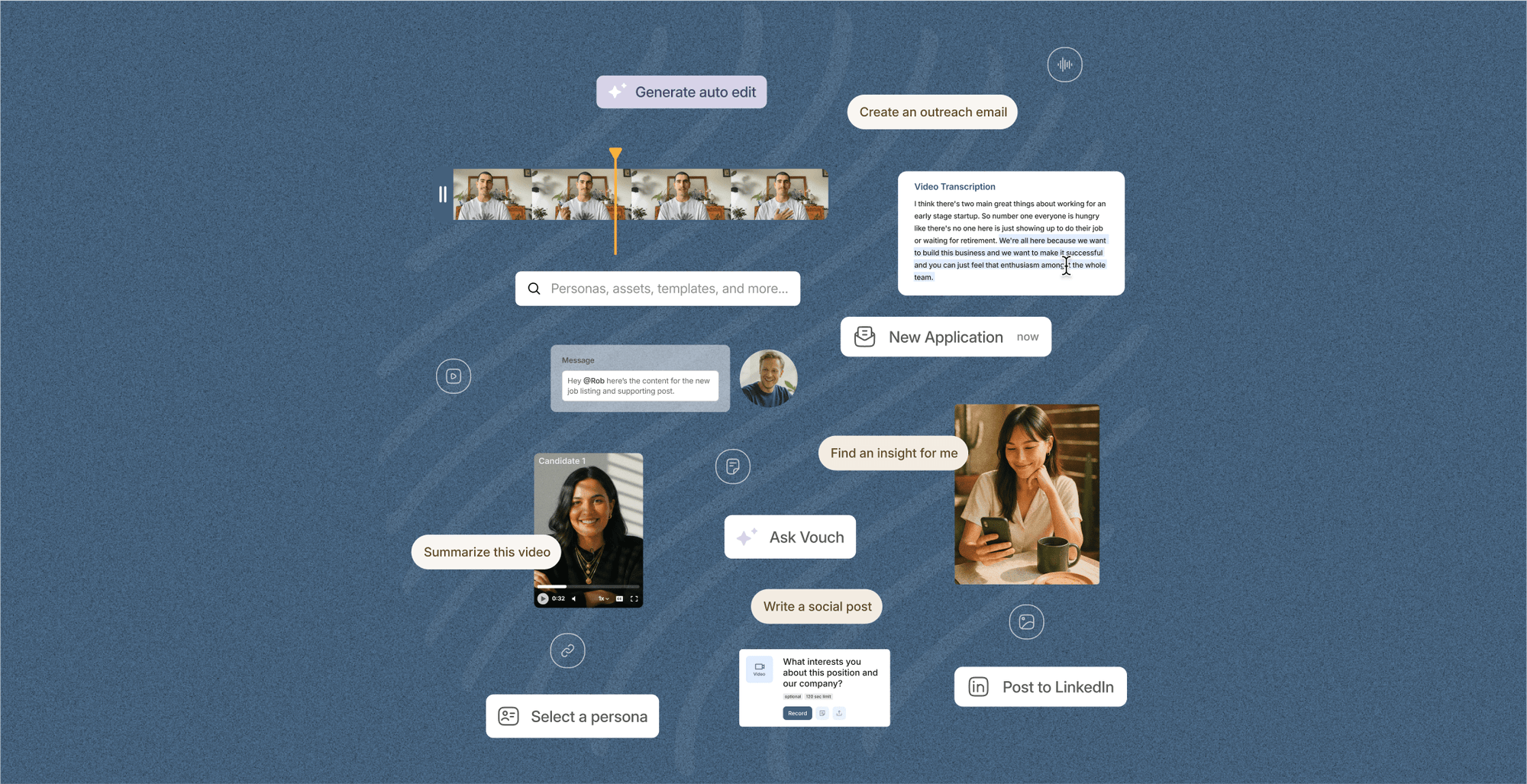Employer Brand is a critical factor in attracting and retaining top talent.
In this article, we cover 25 employer branding statistics and trends that can help you effectively shape your employer brand strategy.
Employer Branding not only affects how potential employees perceive your company but also influences your brand's reputation among customers, investors and stakeholders.
Employer branding plays a crucial role in shaping a company's performance and success.
So, let's get started:
What data shows a strong Employer Brand attracts qualified candidates?
These latest 2026 statistics show just how an effective Employer Brand can take your recruitment process and retention rates to new levels:
- 83% of job seekers research a company’s reviews & ratings before deciding where to apply. That means your online reputation is now a primary top-of-funnel filter for applicants. Glassdoor
- Work-life balance has overtaken pay as the top global motivator (83% vs 82%). Aligning your EVP and messaging with flexibility and balance is now a bigger attractor than pure compensation. Randstad
- 51% of talent leaders are starting or expanding employer-brand investment in 2026, another 39% are maintaining spend. Your competitors are actively scaling brand programs. employers.builtin.com
- 70% of Glassdoor users say they’re more likely to apply if the employer is active on Glassdoor. Simply engaging, updating your profile, posting, etc. moves candidates to action. Glassdoor
- Employer branding ranks as a top-3 effective recruiting channel for 40.3% of tech talent leaders. It’s viewed on par with job platforms, agencies and outbound sourcing for generating qualified pipelines. employers.builtin.com
- Where candidates look: among people planning to change jobs, 54% use job boards/search, 35% use LinkedIn and 34% use social media, clear proof your brand must be strong and consistent across these channels. Randstad Argentina - Empleos Trabajo
- 71% say their perception of a company improves when it responds to reviews. Public, respectful responses to feedback measurably lift your employer brand. Glassdoor
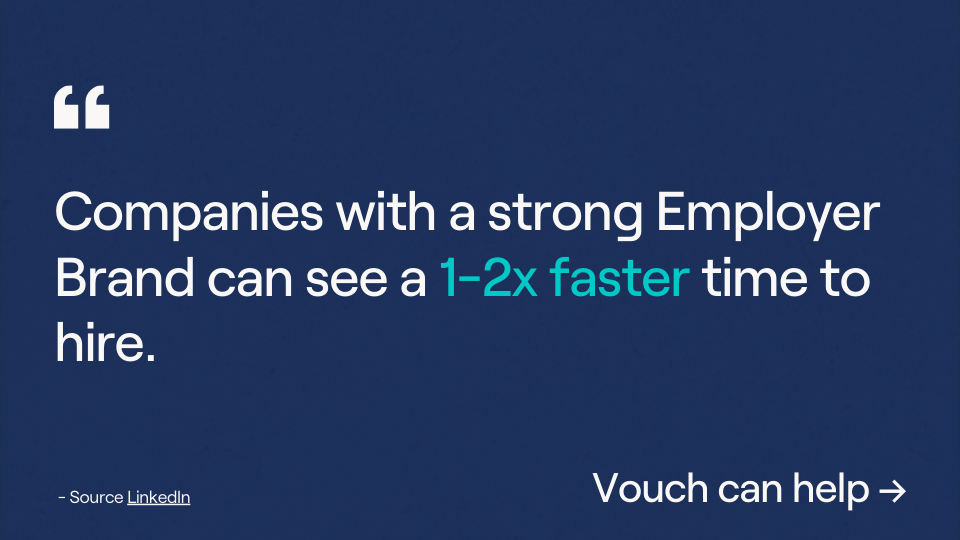
What statistics show what a negative Employer Brand costs companies?
These latest statistics relate to the negative impact a poor Employer Branding, or no Employee Branding and employee value propositions at all, can have on your company:
- ~2× higher cost-per-hire. Employers with a weaker employer brand report cost-per-hire that’s almost double those with a strong brand. LinkedIn Business Solutions
- Reputation damage compounds.72% of candidates who’ve had a bad experience share it, online or directly, amplifying future recruiting and customer-acquisition costs. careerarc.com
- Shrinking applicant pool. Even when unemployed, 81% wouldn’t join a company with a bad reputation, making hard roles even harder (and pricier) to fill. PRovoke Media
- Offer rejections rise, 26% of job seekers declined an offer in 2026 due to a poor hiring experience. Wasting sourcing/interview costs and extending vacancy days. CareerPlug
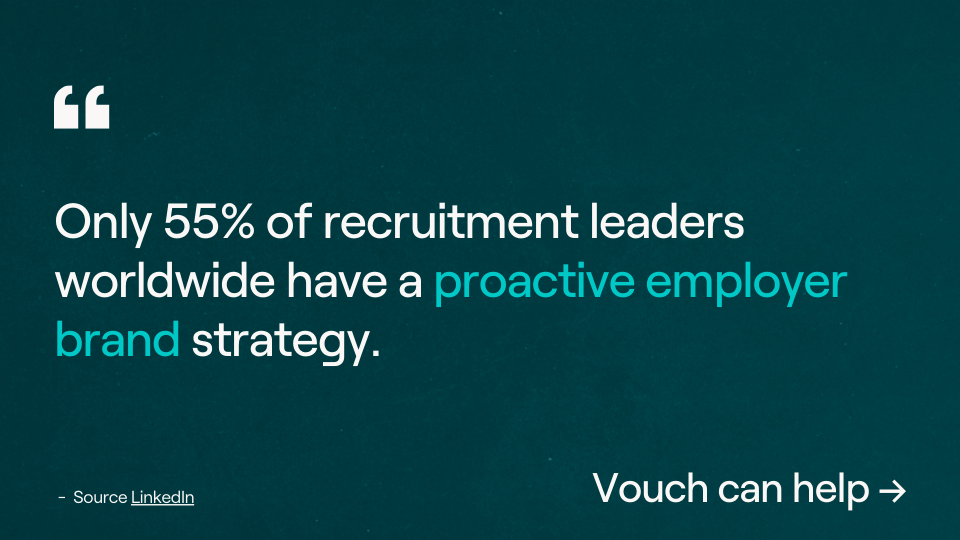
How is Employer Branding and cost-per-hire linked?
These statistics show how an effective Employer Brand can reduce cost per hire for recruitment teams while reducing retention rates:
- Companies with a strong employer brand can see a 50% decrease in cost per hire. Source: Universum
- Employer branding can lead to a 28% increase in retention rates. Source: Michael Page
- Employer branding can reduce the time to hire by up to 50%. Source: Pulse Recruitment
- 76% of candidates consider a company's reputation before applying for a job. Source: Moka
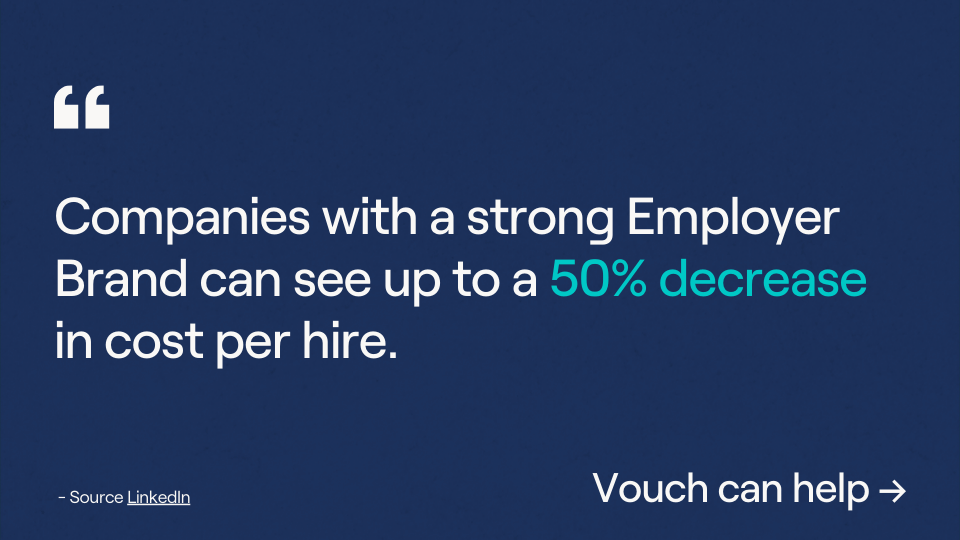
What is the role of social media in employer branding?
These statistics show the role social media has on Employer Branding and your candidate experience as we head into 2026 and beyond:
- Format matters too, video boosts reach.On LinkedIn, video posts generate about 1.4× more engagement; C-suite video activity is rising fast, amplifying leadership’s role in your employer brand. The Australian
- It’s now a near-universal employer-brand channel. In-house recruitment/employer-brand teams “almost all” use social: 98% do, and 65% even run dedicated EB accounts. Content Stadium
- It’s where candidates research you. 62% of job seekers look up a company on social media to assess its reputation before applying—so your socials are part of the pre-apply filter. Insight Global
- It’s one of the best levers to grow your employer brand. Talent leaders calling social media an effective channel for growing employer brand jumped to 54% in 2025. GlobeNewswire
- Employee voices on social outperform corporate handles. LinkedIn finds employee shares deliver ~2× higher CTR than brand posts; companies with socially engaged employees are 58% more likely to attract and 20% more likely to retain top talent.
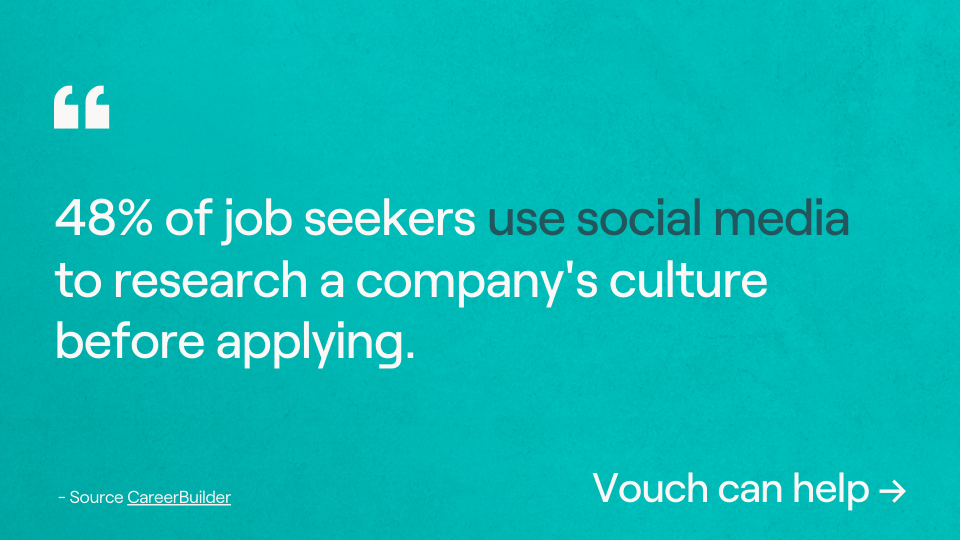
Now in 2026, several key statistics highlight the evolving landscape of employer branding:
- 86% of job seekers research company reviews and ratings before applying for a role. Source: 9cv9 Blog
- 21% of people globally prioritize mental health initiatives as part of a balanced work environment. Source: Universum Global
- 45% of people value fair treatment and inclusion, making DEI metrics integral to building trust and attracting talent. Source: Universum Global
- 30% of people globally prioritize flexible work schedules, highlighting the importance of personalization in work arrangements. Source: Universum Global
These statistics reflect the critical role of employer branding in attracting and retaining talent in 2026, emphasizing authenticity, employee well-being, DEI, and flexibility.
Summary: Employer Branding Statistics
These insights demonstrate the role that employer branding plays in influencing company performance and the hiring process - and why leading companies across most industries invest in their Employer Branding.
By building and maintaining a strong employer brand, organizations can attract top talent, reduce recruitment costs, enhance consumer perception, and ultimately drive business success.
Bring your employer brand to life
- Empower employees’ storytelling
- Transform careers sites with video
- AI-driven video editing
- Publish videos anywhere
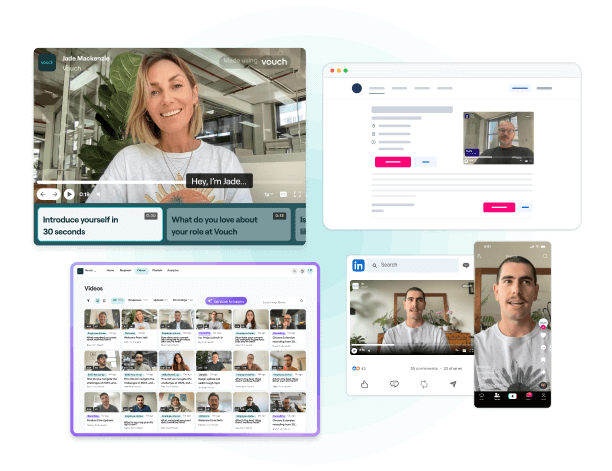
🧐 Some further reading, including the 7 biggest employer branding trends in 2026!
When we look at the future of employer branding and where the statistic will go, we need to look at the trends right now and how they have evolved.
What are the 7 biggest employer branding trends in 2026?
When we look at the past trajectories and ongoing developments, in not only the field of employer branding, but also marketing and employee experience, we see the employer branding trends in 2026 shift more towards:
1. Authenticity and Transparency Matter, And Why Video Also Matters
Authenticity is perhaps the number one employer branding trendsin 2026, and millions of companies are now focusing on creating a more open workplace where employees understand all of the workings of the company. To do this, companies are sharing genuine employee stories, customer stories and experience, and transparent communication about company values and practices. If you only focus on one thing, make it authenticity
2. Stronger Focus on Diversity, Equity, Inclusion and Belonging (DEIB)
The next biggest employer branding trends in 2026 is seeing companies increasingly prioritize DEIB initiatives in their branding efforts to attract and retain diverse talent. A big part of this is combating global inflation and making sure the workplace is a safe place employees want to be. The initiatives include highlighting inclusive workplace policies, diverse employee profiles, and community engagement.
3. Employee Advocacy and Engagement
If you have authenticity and DEIB, then employee advocacy will soon follow, and encouraging employees to become brand advocates through employee advocacy programs and employer branding initiatives can amplify the authenticity and reach of the company's messaging. The result? You will not only attract higher levels of talent, but also new customers as they want to work with genuine companies like yours.
4. Remote and Hybrid Models Are Expected
People are now more than ever, looking for positions that offer a remote or hybrid work model. This is to save time and costs commuting, and also to be able to have a better work-life balance. In 2026 employer branding strategies should emphasize flexibility, work-life balance, and remote-friendly company cultures to help attract top talent.
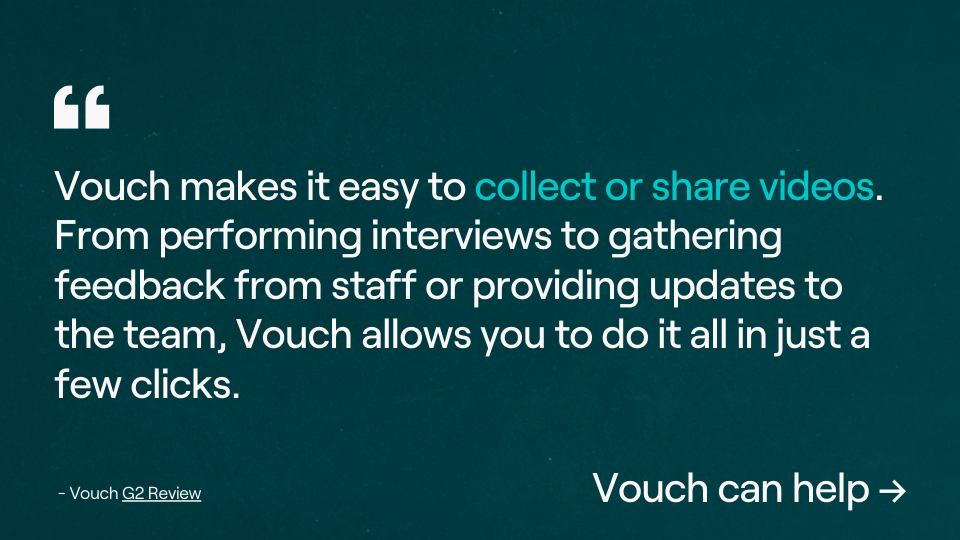
5. Employee Well-being and Mental Health
Like remote and hybrid models, employer branding trends in 2026 incorporate initiatives related to employee well-being, mental health support, and work-life balance. For billions of people in all countries around the world, we are living in uncertain times. Showcasing your company's commitment to the holistic health of its workforce can go a long way, especially for retention.
6. Further Technology Integration
Leveraging technology, such as modern video tools like Vouch and AI-driven recruitment tools, virtual reality (VR) experiences for showcasing company culture, and chatbots for candidate engagement, can enhance the effectiveness of employer branding efforts. Just with all technology, be sure to make the employee contact and experience personal. Technology is just a tool and the data you gather will only ever tell part of the picture.
7. Continuous Learning and Development
Continuing from the last few years, opportunities for professional growth, skill development, and continuous learning within your organization can be a compelling aspect of your employer brand, particularly for attracting top millennial and Gen Z talent who are eager to learn and absorb.
What is the future of social media marketing and Employer Branding?
Social media platforms such as LinkedIn, Facebook, and Twitter have become go-to resources for job seekers looking for career opportunities.
These platforms allow candidates to research companies, gain insights into their culture, and assess their reputation as employers. By maintaining an active and engaging presence on social media, companies can effectively reach and engage with potential candidates.
Social Media and Building Trust
Many companies believe that social media marketing will be the most in-demand HR skill by 2026, and it makes sense.
Social media is evolving as a key competency for HR professionals in building and enhancing the employer brand. Employers recognize the need to invest in social media marketing skills to effectively promote their company culture and attract top talent.
As the digital landscape continues to evolve, being proficient in social media will be crucial for successful employer branding strategies.
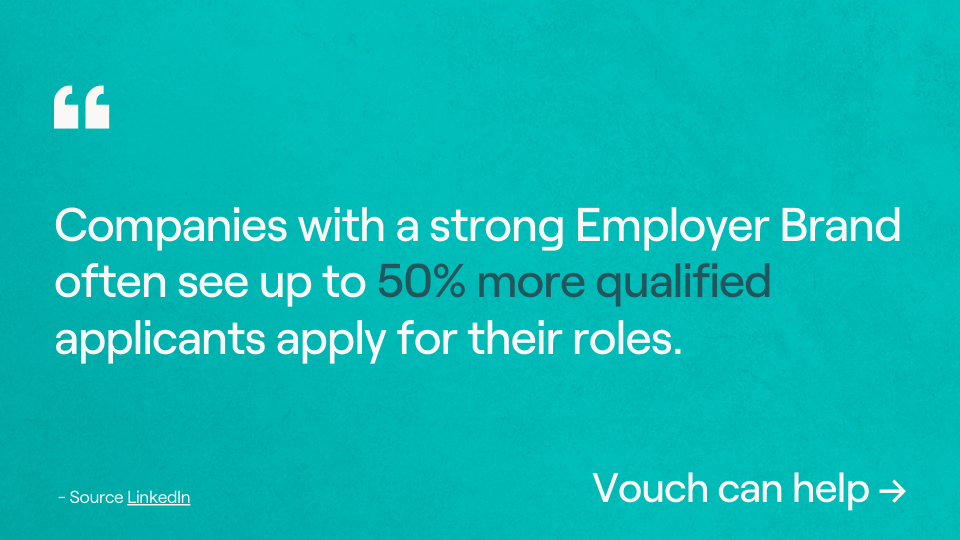
Why does building a strong Employer Brand rely on your employees?
Creating a strong employer brand and working towards the positives of the employer brand statistics, really is a collaborative effort that involves both your company executives and employees.
When building your employer brand, it's important to harness the power of social media and leverage the authentic voices of your employees.
Here are some key factors to consider:
- 98% of people use at least one social media channel, and over 50% of people on LinkedIn are not only following their current employer but also a competitor in the same industry. Social media platforms provide employees with an opportunity to share their experiences, values, and achievements with a wider audience. Encouraging employees to engage with social media and share their stories can help enhance your employer brand.
- It's said that one of your employee's voices is up to three times more credible than the CEO's when talking about working conditions in the company. When candidates are researching potential employers, they trust in the experiences and opinions of current employees, not your execs. By empowering your employees to share their authentic perspectives using tools like Video, you can build credibility and attract top talent.
- When employees actively participate in promoting your company culture on social media, it creates a ripple effect. Their engagement can inspire others to join the conversation and showcase the positive aspects of your organization to a wider audience.
Empowering your employees to be brand advocates can build a strong employer brand that resonates with candidates and sets your company apart from the competition. Harness the power of social media, encourage employee engagement, and let their voices amplify your brand and mission.
How do you "technically" measure Employer Branding success?
Measuring the success of your employer branding efforts is crucial to understand the effectiveness of your strategies. By tracking key metrics, you can determine the impact of your employer brand and make informed decisions to optimize your approach. Here are some common metrics to consider:
1. Number and experience of applicants
One of the most straightforward ways to measure employer branding success is by tracking the number of applicants for your open positions. An increase in the quantity and quality of applicants suggests that your employer brand is resonating with potential candidates.
2. Reduce cost per hire
Another important metric to consider is the cost of hire. By analyzing the expenses associated with recruiting and onboarding new employees, you can assess the efficiency of your employer branding efforts. A well-established employer brand can attract qualified candidates, reducing the time and resources required for recruitment.
3. Improve retention rates
The retention rate is a valuable metric to gauge the long-term impact of your employer brand. A strong employer brand can help foster a positive work environment and improve employee satisfaction, ultimately reducing turnover rates.
Measuring the success of your employer branding efforts allows you to identify areas for improvement and make data-driven decisions. By continuously monitoring these metrics, you can refine your strategies and strengthen your employer brand over time.
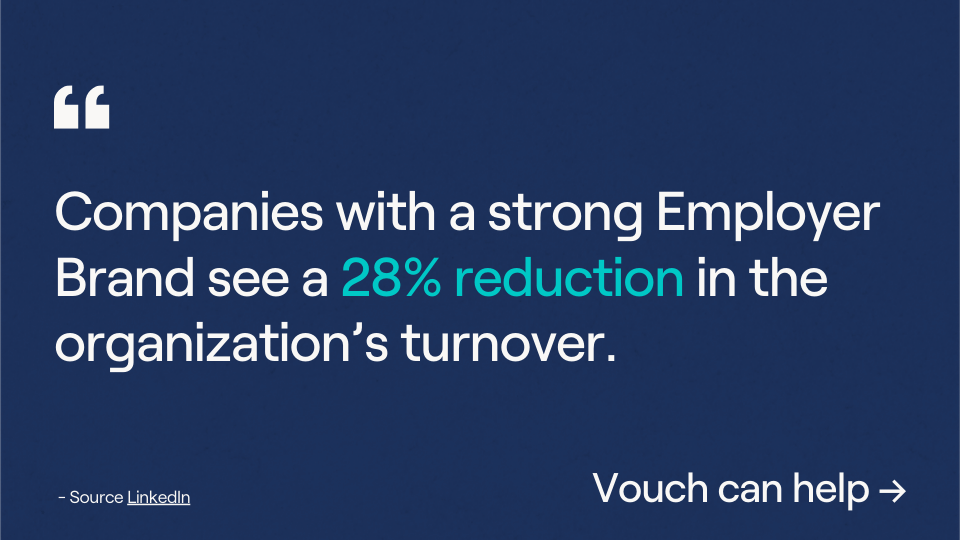
How does LinkedIn help drive Employer Branding?
LinkedIn is one of the most powerful platforms for building a strong employer brand and engaging with potential candidates.
Consider these key strategies on LinkedIn:
- New employees sourced through LinkedIn are 40% less likely to leave the company within the first 6 months. This highlights the importance of leveraging LinkedIn to attract and retain top talent.
- Over 75% of people who recently changed jobs used LinkedIn to inform their career decision. This indicates the significant role LinkedIn plays in the job search process and how it can influence candidates' perceptions of your company.
- Companies with a strong talent brand on LinkedIn grew 20% faster. This demonstrates the positive impact LinkedIn can have on a company's growth and success.
- Companies with a strong talent brand on LinkedIn have a 31% higher InMail acceptance rate. This showcases the effectiveness of LinkedIn as a communication tool for engaging with potential candidates and building relationships.
By actively utilizing LinkedIn for employer branding, you can enhance your company's reputation and attract high-quality candidates who align with your organization's values and goals.
Who are the top 10 companies in the world when it comes to Employer Branding?
Here's a list of the Top 10 Companies Globally Known for Outstanding Employer Branding as of 2026, based on industry recognition, consistent rankings in employer reputation platforms like LinkedIn, Glassdoor and Universum, and the strategic initiatives to attract and retain top talent.
And these companies all share several key employer branding practices, they:
- Treat employee experience as a brand strategy.
- Leverage emotional storytelling and employee advocacy.
- Offer flexibility, development, and a purpose-driven workplace culture.
1. Google
- Why they're known: Innovative culture, campus perks, transparent feedback loops, and compelling storytelling:
- Careers Page: https://careers.google.com
2. Microsoft
- Why they're known: Emphasis on growth mindset, inclusive values, internal mobility, and leadership visibility.
- Careers Page: https://careers.microsoft.com
3. Salesforce
- Why they're known: “Ohana” culture, purpose-driven branding, social responsibility, and workplace equality.
- Careers Page: https://www.salesforce.com/company/careers
4. Unilever
- Why they're known: Youth-focused leadership programs, strong purpose marketing, and sustainability focus.
- Careers Page: https://www.unilever.com/careers
5. HubSpot
- Why they're known: Radical transparency, distributed teams, culture code, and people-first philosophy.
- Careers Page: https://www.hubspot.com/careers
6. LinkedIn
- Why they're known: Authentic personal branding, inclusive hiring, and highly human-centric messaging.
- Careers Page: https://careers.linkedin.com
7. Adobe
- Why they're known: Creative expression, innovation-driven roles, strong DEI efforts, and remote flexibility.
- Careers Page: https://www.adobe.com/careers.html
8. Spotify
- Why they're known: “Work from Anywhere” model, bold brand persona, and creative-centric environment.
- Careers Page: https://www.lifeatspotify.com
9. Netflix
- Why they're known: High-performance culture, transparent culture deck, and emphasis on ownership.
- Careers Page: https://jobs.netflix.com
10. SAP
- Why they're known: Accessible leadership, career development, strong DEI footprint, and well-being support.
- Careers Page: https://www.sap.com/about/careers.html
5 Employer Branding Quotes To Remember In 2026?
To sum up "why" employer branding matters so much, we only need to look to the leaders in their fields.
Here are concise, real quotes on the biggest employer-branding trends, each one linked to its source:
- “You’ll need to upgrade your talent playbooks to stay ahead and unleash all that’s possible.” — Teuila Hanson, LinkedIn CPO. LinkedIn Business Solutions
- “Over half of US employers are actively integrating AI tools into hiring processes.” — Universum, Employer Branding Now 2025 (US). universumglobal.com
- “Employer branding in 2025 is less about glossy career videos and more about surviving the algorithm wars.” — Employer Branding News. Employer Branding News
- “Over half (55%) are willing to quit if they feel they don’t belong.” — Randstad Workmonitor 2025. Randstad
- “Besides ‘My employer,’ no institution is fully trusted to address discrimination, despite high expectations.” — Edelman Trust Barometer 2025 (US Special Report). Edelman
FAQs
What is employer branding, and why is it important?
Employer branding refers to the reputation and perception of a company as an employer. It is important because it directly impacts a company's ability to attract and retain quality employees, as well as influence how buyers and prospects see the brand.
How does employer branding affect revenue?
Employers believe that employer brand and reputation can impact revenue, with 96% of companies acknowledging this. However, only 44% actually monitor the impact.
Does a company's reputation as an employer influence job seekers?
Yes, a company's reputation as an employer is a significant factor for job seekers. 84% of job seekers consider the reputation of a company when deciding where to apply for a job.
Can investing in employer branding reduce employee turnover?
Yes, investing in employer branding can reduce employee turnover by 28%.
How does social media impact employer branding?
Social media plays a significant role in employer branding. Job seekers rank social media and professional networks as the most useful job search resources. Additionally, potential candidates use social media channels to research and get a sense of a company's culture.
What are the benefits of having a strong employer brand?
Having a strong employer brand helps attract quality candidates, reduces staff turnover, and is seen as an integral part of a company's overall business strategy.
How can employer branding be measured?
Common metrics used to measure employer branding include the number of applicants, cost of hire, retention rate, and quality of hire.
How can LinkedIn be used to build a strong employer brand?
LinkedIn can be used to source new employees, as new employees sourced through LinkedIn are 40% less likely to leave the company within the first 6 months. Additionally, having a strong talent brand on LinkedIn can contribute to faster company growth.
Why is employer branding important in the job search process?
Employer branding is important in the job search process because 75% of job hunters consider an employer's brand before applying for a job. A strong employer brand can also decrease the average cost per hire and increase the number of qualified candidates applying for a position.
How does a strong employer brand impact company performance?
Companies with a strong employer brand are 2x more likely to attract qualified candidates, and 61% of staff said they would leave their current employer for one with a better brand.
Conclusion
Employer branding is essential in today's competitive job market to attract top talent and stand out as an employer of choice.
Furthermore, it's shown that the benefits of having a strong employer brand help reduce staff turnover and decrease the average cost per hire. Employers who prioritize their brand strategy and invest in employer branding, are more likely to have a stronger, more committed workforce.
As you navigate the ever-changing landscape of employer branding, remember to continuously analyze your employer brand performance, latest software tools, and adapt your strategies accordingly.
Tools like Vouch also make building a magnetic Employer Brand remarkably easy, helping you create video content that captures authentic employer reviews and employee experiences.
See Why Employer Brand Managers Love Vouch!
Loved by companies like Canva, Nike, Cisco, HubSpot, Amazon and more, tools like Vouch make leveraging video in your business remarkably easy.
Be sure to book a Vouch demo today and chat with a video content expert.
You might also like

Elevate Your Brand Today With Vouch
Discover how Vouch can accelerate talent acquisition while helping you stay on-brand.

